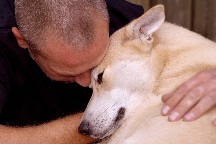By Justin McClelland, December 6, 2009
LEBANON — Amy Neal and Ruth Bertagna are adamant that old dogs can learn new tricks.
As two volunteers at the Humane Association of Warren County in Lebanon, both insist that older pets can provide a lot of value and love to families looking to add a four-legged member to bring to their home. And the biggest trick these volunteers are looking to perform is to find homes for the shelter’s increasing older pet population.
“There are lots of positives to adopting a senior,” Neal said. “Puppies and kitten can take a lot of patience to train and figure out their personality. With older pets, what you see is pretty much what you get.”
Mari Lee Schwarzwalder, executive director of Warren County’s Humane Association, said the animal shelter has seen a steep increase in older pets — both cats and dogs — in the past six months. Many of these pets were left behind by families who had to move for new jobs or were forced to locate to smaller apartments that didn’t allow pets.
“It’s not usually their first choice to leave the pets,” Schwarzwalder said.
Such is the case for Hudson, a 7-year-old black Labrador mix whose family had to leave him behind when they left Lebanon for an out-of-state job. He is excitable and friendly, and also already housebroken and eager to show affection.
“Older pets have a tremendous amount of love to give,” Bertagna said. “This may sound silly, but they really do understand and appreciate being rescued.”
Neal said that older pets often are more mellow and require less strenuous exercise (in the case of dogs) to care for.
“They often make an easier transition to a new home than a puppy,” Neal said. “They enjoy easy living.”







